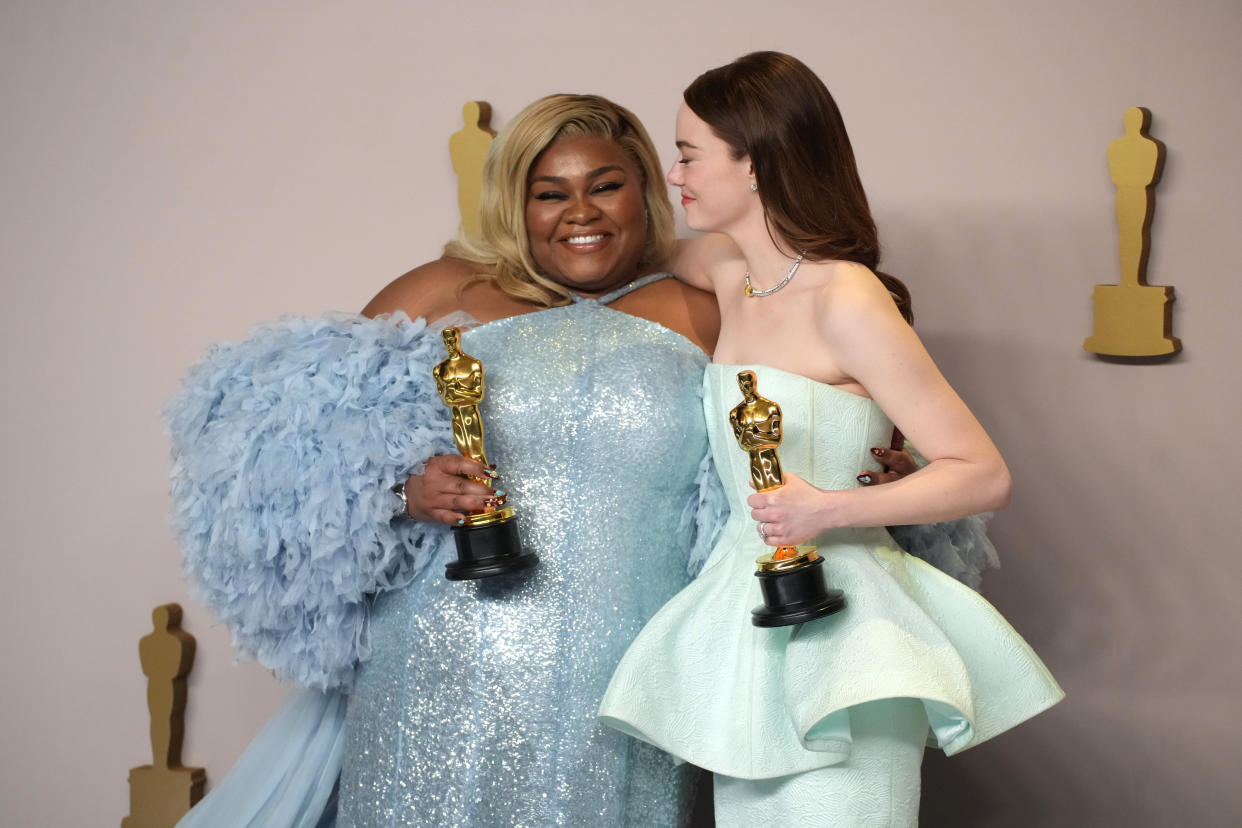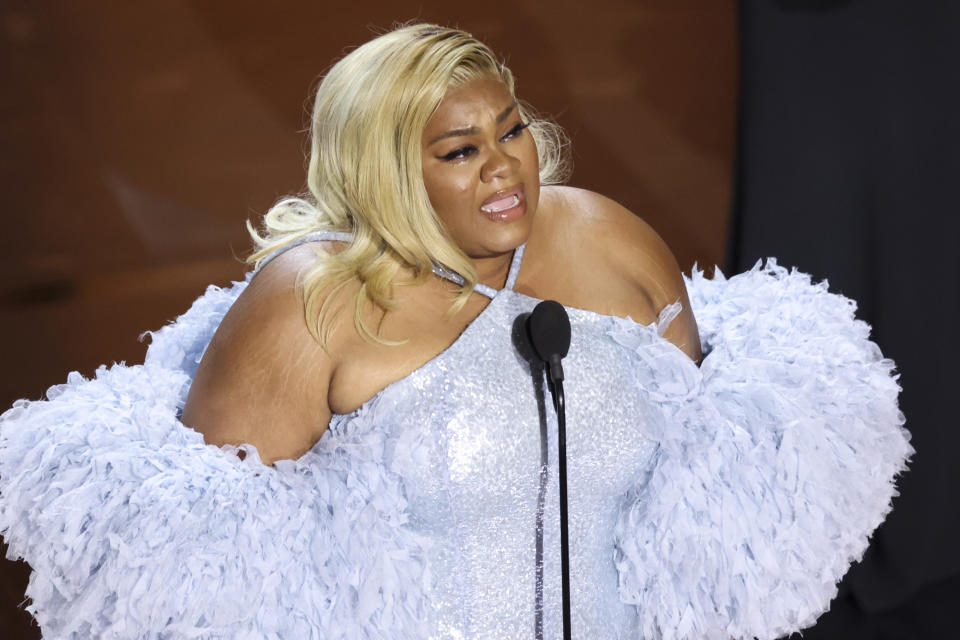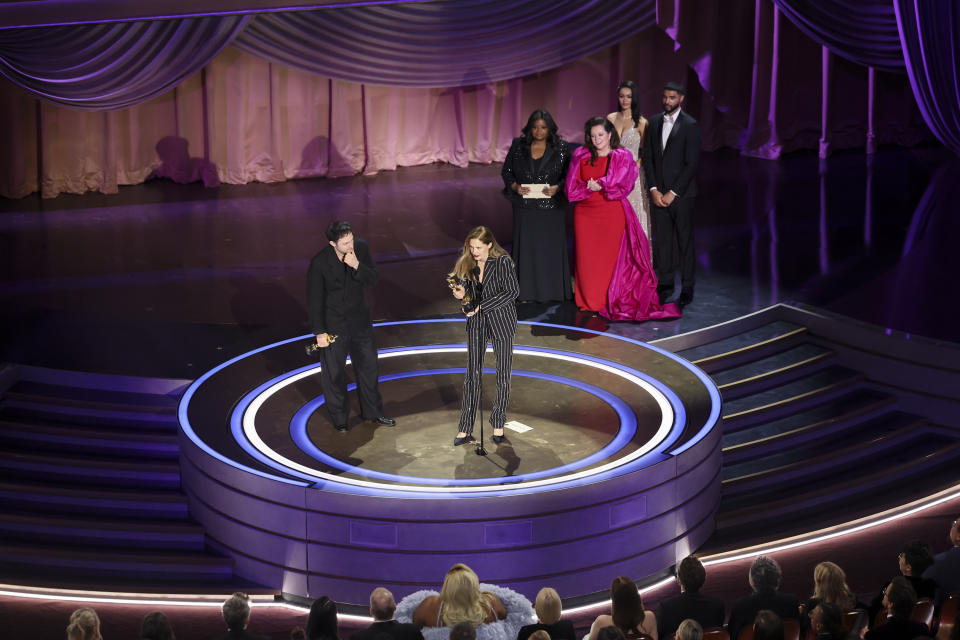Women Made History at This Year’s Oscars — Despite One Notable Disappointment

First things first, just what everyone wants to read the morning after Oscar Sunday: stats. At this year’s ceremony — which, thanks to an earlier start time, blessedly wrapped up before 10:30 p.m. ET — 13 women won Oscars (that includes categories in which multiple people are honored for one film, as is the case with the Best Picture winner, “Oppenheimer,” or the Best Visual Effects winner, “Godzilla Minus One”). 11 of those winners enjoyed their first Academy Award win ever. That means that, at the 2024 Oscars, nearly 85 percent of its female winners smashed one of Hollywood’s highest, brightest ceilings for the first time.
As ever, that stat comes with a caveat or two, as some of the night’s biggest wins for female stars were repeats: Billie Eilish (alongside brother Finneas O’Connell) picked up her second Best Song win for the Barbie track “What Was I Made for,” making her the youngest two-time Oscar winner ever. And, perhaps most notably, a stunned Emma Stone won her second Best Actress statuette for her work in “Poor Things,” beating out first-time nominee Lily Gladstone for “Killers of the Flower Moon.”
More from IndieWire
It’s hard to imagine anyone looking as shocked and dismayed by an Oscar win as Stone did on Sunday night. Despite the actress enjoying her latest campaign run for the Yorgos Lanthimos fantasia, the “Poor Things” star and producer made sure to champion Gladstone (and vice versa) along the way, with the pair locked in a back-and-forth race to the top throughout the season. Much has been made of the historic nature of Gladstone’s nomination (she would have been the first Native American to win in the category), and there’s little doubt Stone realized, almost immediately, what her win meant for the end of Gladstone’s history-making run.
Last night was not Gladstone’s night, however, and as disappointing as it was that she didn’t walk away with her first Oscar — smashing records in the process and joining a proud cadre of other first-timers — we don’t have much doubt her time will come, and soon.

Elsewhere, first-time women winners were myriad: super-producer Emma Thomas won her first Oscar for her husband Christopher Nolan’s “Oppenheimer” (onstage, he joked that she’s the foremost producer of his films and children) after three nominations in the category. French filmmaker Justine Triet, also nominated for Best Director for her “Anatomy of a Fall” (also up for Best Picture), won her first Oscar for Best Original Screenplay, which she shared with her own partner, Arthur Harari. “This will help with my midlife crisis,” the filmmaker joked upon her acceptance. Writers!
Even the first Oscar of the evening was given to a first-time winner and a first-time nominee, with “The Holdovers” Best Supporting Actress winner Da’Vine Joy Randolph rounding out an awards season she absolutely dominated with one final, glittering win. And Randolph’s category was stacked with fellow competitors whose wins would have also been their first, including Emily Blunt, Danielle Brooks, and America Ferrera (fifth nominee Jodie Foster has already won two, both in the Best Actress category).
In the Best Documentary Feature category, plenty of history was made: not only was Mstyslav Chernov’s “20 Days in Mariupol” the first Ukrainian film to ever win at the Academy Awards, the director (also a first-time winner) was joined by a pair of female producers also accepting their first statuettes: Raney Aronson-Rath and Michelle Mizner. It was the first nomination for all.

As for the crafts categories, while the immediate Oscar-night story was a shared dominance between “Poor Things” and “Oppenheimer,” real history was made with first-time wins for six female artisans, from “Godzilla Minus One” visual effects artist Kiyoko Shibuya to “Oppenheimer” editor Jennifer Lame, both on hand to celebrate their first nominations and first wins.
Shibuya, the film’s VFX supervisor and producer, is only the third woman to win an Oscar in the category (previous winners include Sara Bennett for 2014’s “Ex Machina” and Suzanne M. Benson for 1986’s “Aliens”). And Lame joins a proud tradition of female editors who have won in the category, including Thelma Schoonmaker (also nominated this year for her ninth time, with three past wins) and Anne V. Coates.
Tucked in the middle of this year’s ceremony was a real treat for craft wonks, as the Academy awarded its statuettes for Best Makeup and Hairstyling, Best Production Design, and Best Costumes in bing-bing-bing fashion, with all three not only going to “Poor Things,” but all three including first-time female winners among their ranks. The film’s makeup artist Nadia Stacey won her first Oscar (after previously being nominated for “Cruella”), while Holly Waddington walked off with her first Best Costume Design (on her first nomination). Production designer Shona Heath and set director Zsuzsa Mihalek won their first Best Production Design statuette on their first nominations.
What’s the future of movies? What’s the future of the Oscars? After the live-event adrenaline of this year’s show — hell, this year’s season — such questions are inevitable and mostly unanswerable. But armed with a lineup of brand-new winners, and a fresh crop of rising stars who have already proven to be at the top of their game, we have a bit of an inkling of what’s next. It’s worth looking forward to.
Best of IndieWire
2023 Emmy Predictions: Who Will Win at the Primetime Emmy Awards?
2023 Emmy Predictions: Outstanding Documentary or Nonfiction Special
2023 Emmy Predictions: Outstanding Documentary or Nonfiction Series
Sign up for Indiewire's Newsletter. For the latest news, follow us on Facebook, Twitter, and Instagram.

 Yahoo News
Yahoo News 
